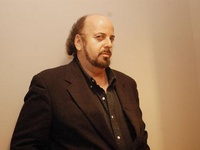“You don’t get to any truth by softening things, by trying to push it into the middle,” he says. “You get to the truths of people by pushing them out to the edges of human behavior and human emotion. I’m trying to create circumstances where they’re forced into radical action and self-revelation.”
Pushing the Envelope
Controversy, or at the very least disagreement, among the critical community, is a key element of Toback’s career. His directorial debut, 1978’s Fingers, was, as Toback describes it, “defiled, defamed and rejected except by a handful.” That “handful,” however, included famed critics David Thompson and Pauline Kael, and the film is now regarded as an American cinema classic.
But even though Toback’s films always have their loud supporters, the most likely reason for his remaining a proficient and functional artist amidst storms of critical attacks is the simple fact that he doesn’t let it get to him.
“I would certainly feel that if I made a movie that everybody liked there was some failure of ambition in the movie,” he says. “And I would probably feel if I made a movie that everybody disliked that I was in some weird place in relation to the current world.”
What is perhaps most striking about Toback’s cinematic repertoire is that he has always stayed on the fringes of commercial cinema. Though he describes his relationship with Hollywood as a “mutual resistance,” the closest he has come to personal involvement in a major Hollywood production in the last fifteen years was writing the screenplay for Barry Levinson’s Bugsy.
But Toback’s aversion to studio filmmaking could hardly be described as ideological. His films typically take on issues that are not commonly approached in contemporary mainstream filmmaking.
“Dealing with the dread, with the void, with madness. Those are reasons to make movies,” he says. “Without those reasons, making movies would be no more appealing to me than doing jingles for some ad agency. It isn’t that making movies is inherently an interesting occupation.”
Starting his cinematic work in the 1970s during a period of American cinema in which experimentation was highly valued (primarily due to the steady economic breakdown of Hollywood in the ’50s and ’60s), Toback sees the Hollywood of today as a kind of dead space in which filmmakers are always pushed to “shoot for the middle.” He sees dealing honestly with adverse topics a near impossibility in the mainstream cinematic landscape.
Says Toback, “The system right now as it exists is so filled with checks and balances, with restraints and cautions, with marketing strategies that involve shaving off the extremes so that you can hit some mythical common denominator in the middle of America, that it’s almost impossible for someone who has an agenda like my own to function fruitfully within it.”
Toback may seem overzealous in his denouncement of the tenets of Hollywood cinema, but, nonetheless, it’s difficult to deny that very few mainstream directors could pull off not only the sexual content, but also some of the visual and especially sonic experimentation of When Will I Be Loved in a studio setting. This is to say nothing of his earlier films, particularly considering that his latest is actually more digestible than more intense offerings like 1999’s racially charged drama Black and White.
Toback’s consistent fascination with the darkness inherent in human personality and the way that sex can be a tool for self-discovery at the same time that it can inspire madness keep Toback tucked safely away from the norm.
“I’m unseducable by that idea of film as a way of getting rich and famous,” he says. “What then is the point of making movies? To me it has always been to discover fascinating characters and how they behave under extreme circumstances. To get to the bottom of human personality, experiment musically, experiment with image, try things that are ambitious and new.”
Toback’s next project will likely be his “long overdue” semi-autobiography, a project he has been writing for years, even before 2002’s Harvard Man even shot. The coming months will also see the release of the Bobby Darin biopic Beyond the Sea, directed by Kevin Spacey and cowritten by Toback. Regardless of what he chooses to do next, his future projects will likely be as thematically ambitious and daring unless he makes a serious change in genre.
As he puts it, “You can’t do a serious movie in the corporate system now unless you have re-incarnation or some science fiction gimmick.” The message is clear: don’t look for James Toback to be selling out any time soon.
—Staff writer Clint J. Froehlich can be reached at froehlic@fas.harvard.edu.









